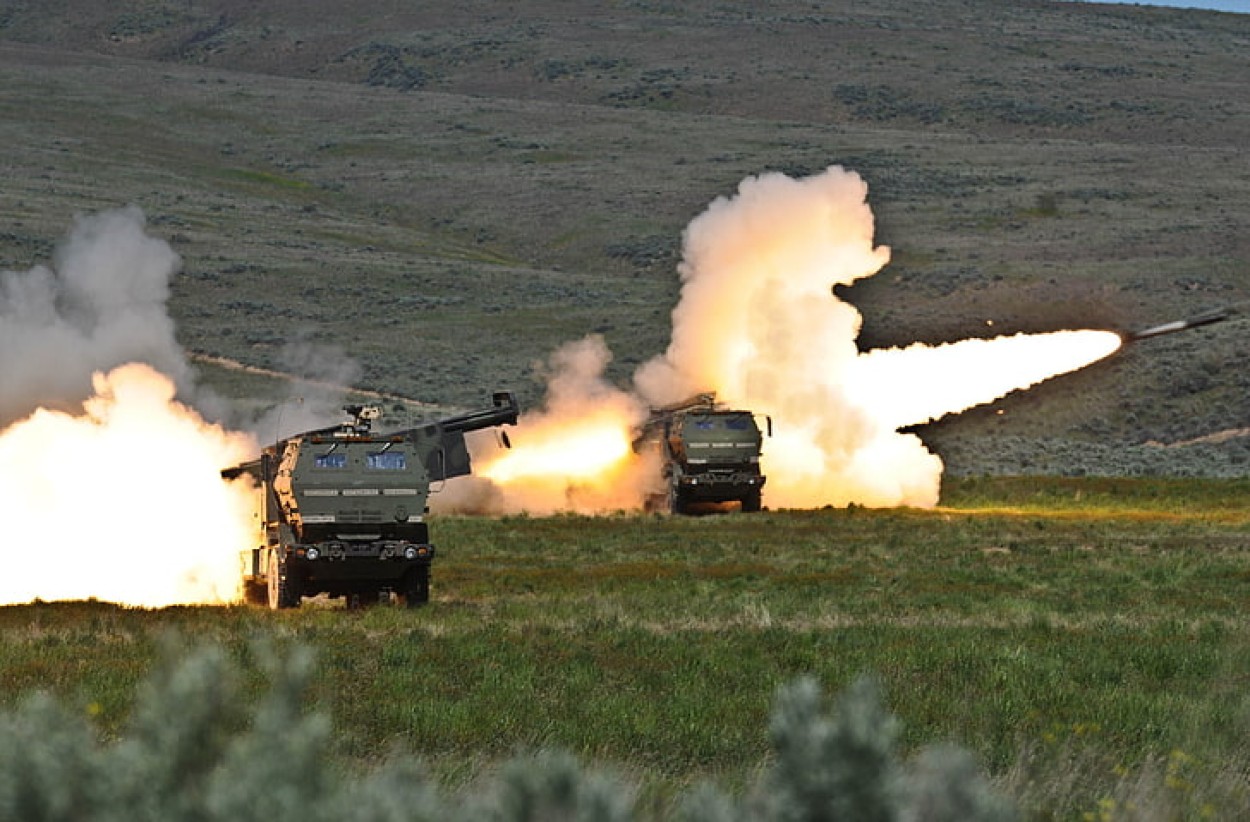Ukraine’s deployment of the High Mobility Artillery Rocket System (HIMARS), a medium-range mobile rocket launcher manufactured by the United States, has emerged as a key asset in its battle against Russia.
MUST READ: Russian Su-34s Can “Disappear” From Enemy Radars As Moscow Arms It With New Anti-EW Suite – Media Claims
The devastating impact of HIMARS MLRS (multiple launch rocket system) strikes has annihilated critical Russian military positions with deadly accuracy.
The United States provided Ukraine with multiple HIMARS systems, which have been developed by defense giant Lockheed Martin. Deployed last summer, these MLRS played a pivotal role in Ukraine’s counteroffensive, cutting off crucial supply lines and compelling Russian forces to withdraw from multiple positions.
Ukraine’s President Volodymyr Zelensky had earlier admitted that HIMARS was altering the trajectory of the war. The influence of HIMARS in the Ukraine war is vividly portrayed by a talented Ukrainian soldier, famed for creating a musical tribute to the Turkish-supplied Bayraktar drone, who composed and released a new song dedicated specifically to HIMARS last year.
Kyiv also employed a clever tactic by deploying HIMARS decoys to lure Russian forces. These decoys successfully deceived Russian forces, wasting expensive long-range cruise missiles on dummy targets.
On the other hand, Russian forces also began prioritizing the destruction of these MLRS, serving as a clear testament to the system’s destructive capabilities and the damage it inflicted on soldiers.
Despite Moscow’s repeated claims of destroying the HIMARS systems, no substantial evidence has emerged to validate these assertions.
Although the strikes conducted by HIMARS had a significant impact on the battlefield last year, the Russian forces have since adapted and implemented tactics that have considerably diminished the threat posed by HIMARS.
China Looks For Counter Measures Against HIMARS
The resounding success of the HIMARS system has captivated the attention of numerous defense and geopolitical experts, who highlight the importance of this weapon system in a potential confrontation with China.
This recognition stems from long-standing hypotheses put forth by US strategists, who have envisioned the key role that HIMARS could play in a conflict involving China.
Given these strategic considerations, the US military has actively explored avenues to harness the power of similar long-range systems positioned across islands in the Western Pacific.
However, observing the war in Ukraine, Chinese military planners have also intensified their research on countering this powerful US weapon. The report, citing an article from a military-affiliated periodical published by a research arm of the China State Shipbuilding Corporation, has revealed that Chinese analysts admire the HIMARS system.

The HIMARS have consistently targeted ammunition depots, logistics centers, and command posts in the Russian rear, resulting in a massive impact on the battlefield, as per the Chinese article.
The analysis highlighted the battlefield advantages of the advanced US rocket system, HIMARS, emphasizing its mobility, survivability, and effectiveness in conventional and guerrilla warfare.
The Chinese analysts noted its ability to carry out high-speed strikes while remaining concealed, reflecting strategic echoes of Mao Zedong’s military thinking. The article also provides a noteworthy perspective on deploying HIMARS systems, emphasizing the potential threat China poses to Taiwan.
In contrast to the discussions by US strategists about dispersing these systems across the Pacific region, the analysis focuses specifically on their anticipated placement within Taiwan.
Chinese strategists consider HIMARS deployment in Taiwan to be the most significant threat. Based on Taiwan’s geography and tactical situation, they expect that HIMARS would primarily be stationed in the western plains of Taiwan and pre-designated positions.
This deployment would provide strategic advantages regarding proximity to potential targets and operational flexibility. The assessment underscores the capability of HIMARS systems based in Taiwan to strike coastal regions of China, mainly targeting landing forces, command sites, and logistics.
This highlights concerns regarding pre-invasion operations, taking advantage of vulnerable Chinese forces during their coastal mobilization.
It also implies the potential supply of longer-range HIMARS munitions to Taiwan, while the United States has exercised caution in providing such extended-range munitions to Ukraine to prevent escalation.
Importance Of Air Superiority
Although Western strategists see HIMARS as a potential deterrent against a PLA invasion of Taiwan, Chinese experts do not consider it invincible. They are actively exploring ways to counter the system.
The Chinese assessment notes the importance of establishing air superiority and employing active attacks to neutralize HIMARS, drawing from observations of Russian combat deficiencies in Ukraine.
Also, Chinese strategists demonstrate confidence in their ability to establish air superiority in a conflict with Taiwan. In terms of battlefield perception and observation, achieving air supremacy and prioritizing intelligence gathering is crucial, as it can put the opponent in a passive position.
Controlling the information domain is a vital weapon, enabling the PLA to accurately detect and locate HIMARS, conduct precise strikes, and secure preemptive victory.

The assessment highlights the HIMARS platform’s speed, mobility, rapid firing, and concealment strengths.
To counteract these advantages, the Chinese assessment suggests emulating the Russian approach of heavily relying on drones for three-dimensional reconnaissance, tracking HIMARS movements, and executing targeted strikes using fighter bombers.
Chinese experts firmly believe in their ability to counter the US rocket system, HIMARS, by employing various strategies, including establishing air superiority, conducting drone attacks, jamming techniques, and utilizing intelligence support.
They highlight the vulnerabilities of HIMARS in terms of mobility and intelligence systems. The effectiveness of HIMARS in a potential conflict in Taiwan is questioned due to the island’s limited hiding spots and China’s extensive mapping.
- Contact the author at ashishmichel(at)gmail.com
- Follow EurAsian Times on Google News




